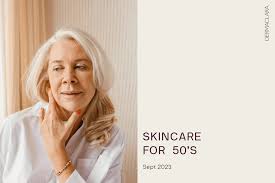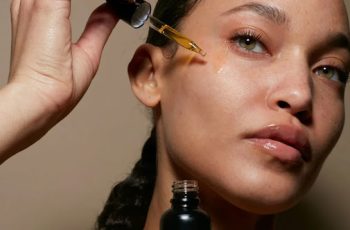
Dermatologist-Recommended Skin Care in Your 50s
For both men and women, anti-aging is often the biggest skin care concern in your 50s. With so many anti-aging products and ingredients out there, however, finding the best skin care in your 50s that actually works can be a challenge. The key is to know which of the 16 skin types you are so we can help you design a customized skin care regimen that is right for your skin’s specific needs.
Before getting into the details of the best skin care in your 50s, take the Skin Type Quiz below so you know which products are a good match for your skin.
Skin care in your 50s should focus on reducing inflammation, repairing DNA damage, and promoting collagen.
Exosomes, growth factors, DNA repair enzymes, and retinoids are the best anti-aging ingredients in your 50s.
Avoid excess sugar, sun exposure, and using the wrong skin care products to help reduce inflammation.
Best Skin Care in Your 50s Routine
While the exact products that are best for your skin will depend on your specific skin type, the ideal routine for skin care in your 50s will include these products:
Sunscreen
Retinoids
Vitamin C (if right for your skin type)
Exosomes or growth factors
DNA repair enzymes
Antioxidants
Most Common Skin Problems in Your 50s
Signs of aging such as fine lines, wrinkles, sagging skin, and dark spots are some of the most common skin problems for people in their 50s. While many factors can influence skin aging, three of the most important to consider when choosing skin care products in your 50s are inflammation, sun damage, and loss of collagen.
Inflammation
As we age, our bodies undergo various changes, many of which are driven by genomic instability, or the gradual accumulation of DNA damage over time. This buildup of DNA damage doesn’t just cause cells to malfunction or die; it also plays a significant role in sparking inflammation, a process that’s closely tied to aging and numerous age-related diseases. Inflammation is a hallmark of aging, often acting as a catalyst for conditions like arthritis, heart disease, and even neurodegenerative disorders.
Recent research sheds light on how DNA damage leads to inflammation. When DNA is damaged, it can activate specific pathways in our cells, such as the cGAS-STING axis and the NF-κB pathway (3). These pathways are like alarm systems, responding to threats by triggering inflammatory responses. Factors that set off these alarms include not only accumulated DNA damage but also the activation of transposons (“jumping genes” that can create or reverse DNA mutations), the presence of senescent cells (cells that have stopped dividing), and persistent R-loops (abnormal structures formed during the process where RNA is made from DNA).
But there’s more to the story. DNA damage can also lead to epigenetic changes, or modifications in how genes are expressed, by redistributing heterochromatin factors, which help to organize DNA in the cell. These changes can further fuel inflammation and accelerate the aging process. Understanding these mechanisms not only deepens our knowledge of aging but also opens up potential avenues for interventions that could reduce inflammation and potentially slow down the effects of aging.
Sun Damage
Our skin also becomes more susceptible to sun damage with age, due to a decline in DNA repair enzymes, which are responsible for fixing UV-induced cellular damage. Over time, the cumulative impact of sun exposure can lead to wrinkles, dark spots, uneven texture, and even an increased risk of skin cancer. Without adequate repair, UV damage accelerates visible signs of aging, including thinning skin and loss of elasticity.
To address this, look for products containing DNA repair enzymes, which can help reverse some of the damage by boosting your skin’s ability to repair itself. Combining these with daily sunscreen use is essential for protecting your skin from further harm and maintaining younger-looking skin. Regular use of these products not only helps to mitigate past damage but also strengthens your skin’s resilience against future exposure, making them a cornerstone of effective anti-aging skin care.
Loss of Collagen
Collagen is the protein responsible for keeping skin firm, plump, and elastic. Unfortunately, collagen production starts to decline as early as your 20s and continues to more rapidly decline with age. Collagen loss speeds up during menopause. This reduction leads to lines, wrinkles, and sagging. Thus, good skin care in your 50s should include ingredients that can promote collagen to reverse some of these effects. One of the most exciting advancements in this area is the use of exosomes in skin care.
Exosomes are tiny, naturally occurring vesicles released by cells that act as messengers, carrying proteins, lipids, and genetic material to other cells. In skin care, exosomes derived from stem cells or other beneficial sources are used to deliver signals that stimulate collagen production, improve skin repair processes, and reduce inflammation. They essentially “teach” skin cells to behave as they did when they were younger, improving the overall structure and function of the skin.
Research suggests that exosomes can not only help to replenish lost collagen but also encourage the formation of new blood vessels, improving skin tone and texture. Products like Plated SkinScience, which incorporate exosome technology, offer targeted benefits for anti-aging by addressing the underlying cellular mechanisms of collagen loss (4, 5).
Best Products for Skin Care in Your 50s
There are many anti-aging products out there. The 2 most important antiaging products to use in your 50 are daily sunscreen and a nightly retinoid- the stronger- the better. These are some of the best researched-backed anti-aging products for skin care in your 50s that are worth investing in.
Plated SkinScience
Plated SkinScience is a cutting-edge skin care brand that uses patented Renewosomes – exosomes extracted from platelets and enhanced with growth factors and antioxidants. These exciting new anti-aging ingredients not only help to promote collagen and skin renewal from the inside out, but they can also reduce inflammation, which is a key contributor to skin aging in your 50s.
Many people ask me what the difference is between the Plated Intense Serum and the Plated Daily Serum. The Plated Intense Serum is the most concentrated formula and is best for more mature or damaged skin. I recommend starting with the Intense Serum for the first 6 to 12 weeks and then switching to the Daily Serum for maintenance.
Rationale
Rationale’s scientifically backed formulations focus on neutralizing oxidative stress, a leading cause of premature aging. Packed with antioxidants, Rationale products work to protect skin cells from free radicals – unstable molecules that damage collagen and elastin, resulting in wrinkles and sagging. The powerful antioxidant protection provided by Rationale reduces the appearance of fine lines, uneven skin tone, and dullness, while supporting the skin’s natural barrier.
Photozyme DNA Repair
Photozyme DNA Repair targets the root cause of many visible signs of aging: accumulated DNA damage. This innovative product contains DNA repair enzymes specifically designed to enhance the skin’s ability to repair UV-induced DNA damage, reducing the appearance of fine lines, dark spots, and uneven skin texture.
By addressing this damage at a cellular level, Photozyme DNA Repair restores the skin’s vitality and resilience, helping to maintain a smoother, more even-toned complexion, making it a must-have for skin care in your 50s.
Anti-Aging Tips for Your 50s
Skin care in your 50s is easier than you might think. The key is to do everything you can to reduce inflammation, including:
Limiting sugar in your diet.
Avoiding sun exposure.
Using the right skin care so you do not cause inflammation with the wrong products.
Know your Baumann Skin Type to choose the best anti-aging skin care in your 50s.
Bottom Line
It is easier than it might seem to improve signs of skin aging in your 50s. The key is to use the right products for your skin type and to know when it’s worth splurging on a product and when it is a waste of your money. Some expensive products like Plated are worth it and can save you money in the long run because you should not need expensive skin treatments to get rid of wrinkles.
Another way to make skin care in your 50s cost-effective is to know your skin type before shopping for products. Do not waste your money on trendy products without proven research or that are not right for your Baumann Skin Type. If you don’t know yours, take a few minutes to take the quiz below to find out.


